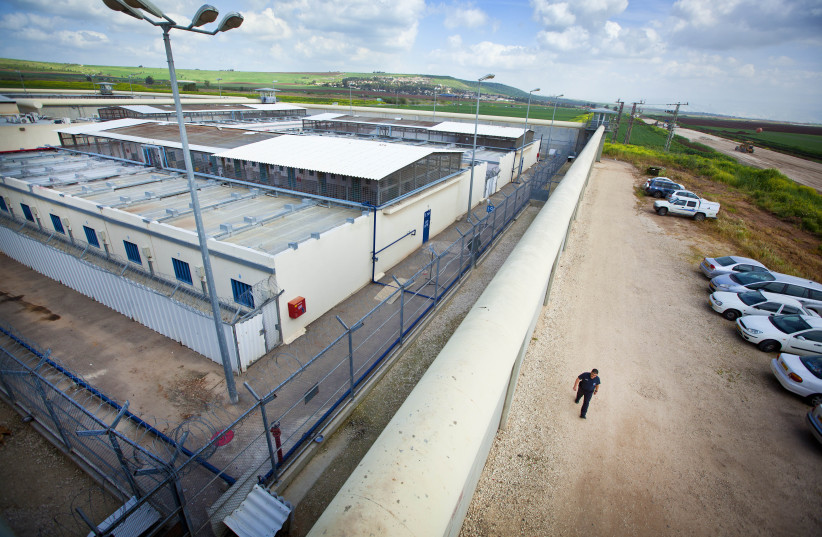The Shawshank Redemption is one of the greatest movies of all time. That’s not just my opinion. According to the American Film Institute’s definitive list of the 100 greatest movies, the 1994 drama starring Tim Robbins, Morgan Freeman and a slew of fantastic supporting actors is ranked at #72.
It is a great human story of hope based on a book by Stephen King about banker Andy Dufresne (Robbins), who is falsely sent to jail and learns to navigate prison life before making a harrowing escape by tunneling through the wall of his cell with a rock hammer.
It is a nice story for a movie. But what happened at the Gilboa Prison on Monday is nothing to be entertained about. The escape of six Palestinian security prisoners – five of whom were convicted for terrorist attacks against Israelis – should be looked at the way the Yom Kippur War was for the IDF in 1973: a wake-up call for a reckoning.
Like that bloody debacle, here too the writing had been on the wall for years. The Israel Prison Service (IPS) has, over time, been beaten down into the poorest and most ineffective law enforcement and security agency in Israel.
The people who serve there are often soldiers or officers who didn’t make it in the IDF or the Israel Police, but were able to get accepted to the IPS. It is a known secret that officers are promoted with little consideration for professional qualifications, like the case of the service’s chief intelligence officer who is a dentist with little intelligence experience.

Getting accepted to the IPS is considered easier in comparison with the IDF or the police, and anyhow, the number of applicants has always been on the lower end.
That is how, for example, the IPS launched a recruitment campaign last year that stirred controversy. With 20% of its staff being Druze – the highest percentage among security agencies in Israel – the IPS tried to change the numbers, asking in application forms that candidates specify their religion. The move drew harsh condemnations from the Druze community, but was seen as an attempt by the IPS top brass to change the demographics.
Over the years, there have been stories of prison guards engaging in criminal activity: In November, a female guard was arrested for having a romantic affair with a prisoner and helping him smuggle drugs into prison; another guard was arrested in March for passing on information to criminals that helped them target other guards; and another officer allegedly installed a camera in a women’s bathroom.
This is not to say that IPS’s ranks are filled with criminals – there are unbelievably dedicated people who work there – but there is a reason the state comptroller regularly reports on problems within prison walls, ranging from the service’s failure to establish a digital system to track prisoners – in some prisons they still do roll call by paper! – to the cleanliness of cells, the rehabilitation of prisoners, and the quality of its staff.
Which brings us to the escape of the six Palestinian security prisoners from Gilboa Prison.
It is true that a slew of operational mishaps and alleged negligence allowed the prisoners to break out of jail under the noses of their guards, and that serious questions will need to be answered in the weeks ahead to prevent future escapes.
But there is a bigger question the State of Israel needs to ask itself, and that is what kind of Prison Service it wants.
Veterans of law enforcement agencies in Israel have felt for years that the IPS is the last priority for politicians. Combined with the assault launched by top politicians against the police, the Justice Ministry and the courts, there has long been an inescapable feeling that some of Israel’s most powerful people prefer to have a weak criminal justice system. They want mediocre people as policemen, prosecutors, judges and prison guards, with mediocre capabilities.
This is what those politicians tried to achieve by refusing to appoint a permanent police commissioner for more than two years, and that is what they tried to do to the Justice Ministry by refusing to appoint a state attorney for 18 months. That is why courts are overburdened, police are understaffed, prisons are run down, and guards are under trained.
Someone wanted the criminal justice system this way, and like most things in life, you ultimately get what you pay for.
Should mishaps like the Gilboa Prison breakout surprise anyone? No. When politicians want the entire system weak, that approach trickles down from the top police officer to the last prison cell.
To think that what happened at Gilboa Prison on Monday is the fault of the prison guard who fell asleep at her post is naïve. The whole system is broken. It needs to be repaired.
***
Where did IDF Maj.-Gen. Aharon Haliva disappear to?
As the former head of the IDF Operations Directorate, Haliva was the officer who at the tail end of Operation Guardian of the Walls - Israel’s anti-Hamas war in May - predicted that the operation had the potential to bring Israel five years of quiet on its southern front.
A few weeks later, Haliva was announced as the next head of Military Intelligence. With the government openly warning of another imminent operation in Gaza, we have to hope that Haliva’s future predictions will have a longer shelf life than his last one.

It’s no secret that in recent weeks the situation between Israel and Gaza has significantly intensified. Sporadic rocket fire, border protests and the sending of incendiary balloons into Israel have all put the IDF on a heightened state of alert. Senior officers and government officials openly admit that another Israeli offensive against Hamas is just a matter of time.
In private, Chief of Staff Lt.-Gen. Aviv Kohavi says there is very little that Israel can hope for beyond waves of additional operations like Guardian of the Walls and 2014’s Protective Edge. Without a larger systemic change, these operations will be Israel’s only option to try to stop the sporadic attacks from the Strip.
This might be true. Israelis might need to resign themselves to a situation that will simply not change. Hamas is a murderous terrorist organization that is bent on Israel’s destruction.
Sometimes, things might just be that simple. But the amount of time that Prime Minister Naftali Bennett and his government are investing in the Palestinian front could indicate that there is an attempt to flip the paradigm.
Early in his term, Bennett flew to Amman and met with King Abdullah. In recent weeks, the Jordanian monarch held similar meetings with Defense Minister Benny Gantz and President Isaac Herzog. In the coming days, Bennett is expected to fly to Egypt to meet President Abdel Fattah al-Sisi.
Gantz met last week in Ramallah with Palestinian Authority President Mahmoud Abbas, who has already spoken on the phone with Herzog a number of times himself. While Bennett continues to declare that he won’t speak or meet with Abbas, this focus on the Arab world is fascinating, especially when coming from this prime minister.
This shift was best illustrated in recent weeks by the return of Qatari money as the latest Band-Aid attempt for Gaza. Together with Gantz, Bennett had tried to find a mechanism that would do away with the suitcases of cash – what a few years ago he called “protection money” – that Qatar was regularly sending to Hamas.
And while chargeable cards will replace the cash, the fact is, Israel does not have any other ideas right now on how to stave off a conflict. The Qatari money seems like something Israel can’t live without, no matter who sits in the Prime Minister’s Office.
Gantz went as far as praising Qatar for the “positive role” it played as a “stabilizing actor in the Middle East.”
Did we hear right? Qatar plays a positive and stabilizing role? Did Gantz forget that Qatar allows Hamas’s top leadership to reside within its borders and to declare from Doha how it will continue to fight Israel and undermine the West? Just a few weeks ago, Hamas congratulated the Taliban for “defeating” the United States, posting pictures of its leader Ismail Haniyeh meeting with Taliban officials in (where else) Doha.
Gaza, Qatari money and Gilboa Prison are all a connected part of the same problem: Israel today seems to work according to a policy of “do whatever you can to achieve quiet.”
This is Israel’s approach to Gaza, and the same in Israeli prisons, where Palestinian security prisoners receive preferential treatment – satellite TVs, barbecues, ping-pong tables and more – all in an attempt to keep them happy, satisfied and quiet.
The problem is that this is anything but a strategy. It is a policy of containment that works as long as rockets aren’t fired from Gaza or prisoners don’t escape their cells. When that happens, everything comes crumbling down, and it’s not just the dirt underneath Gilboa Prison.
